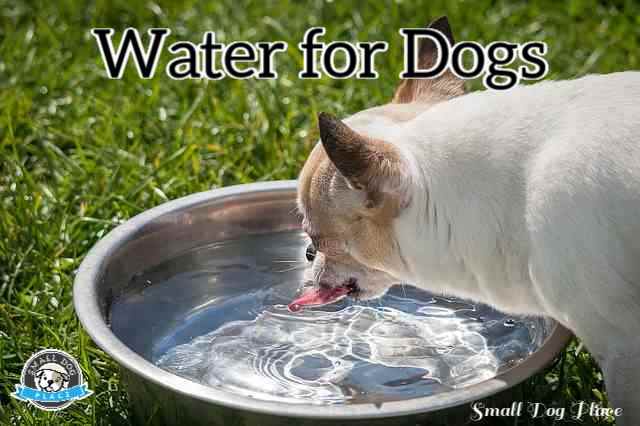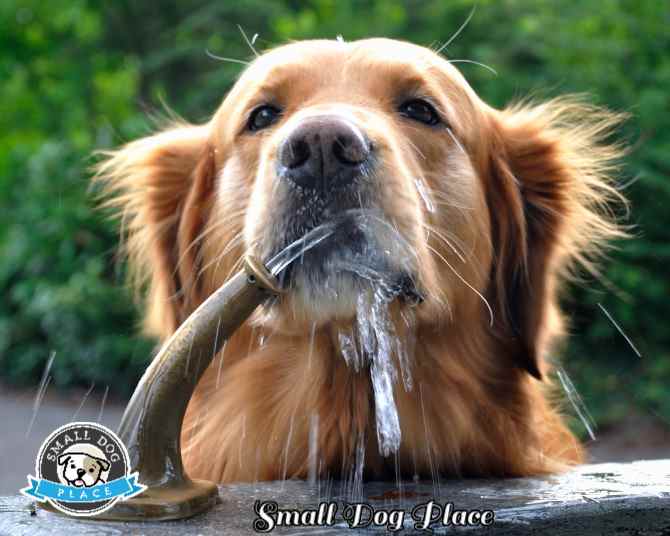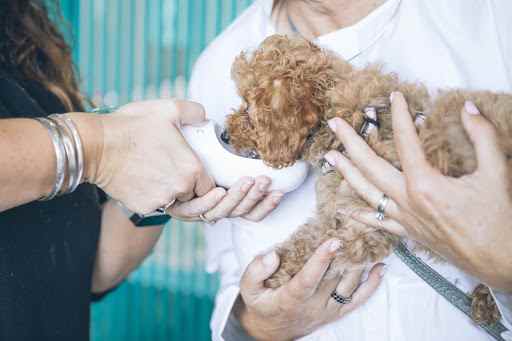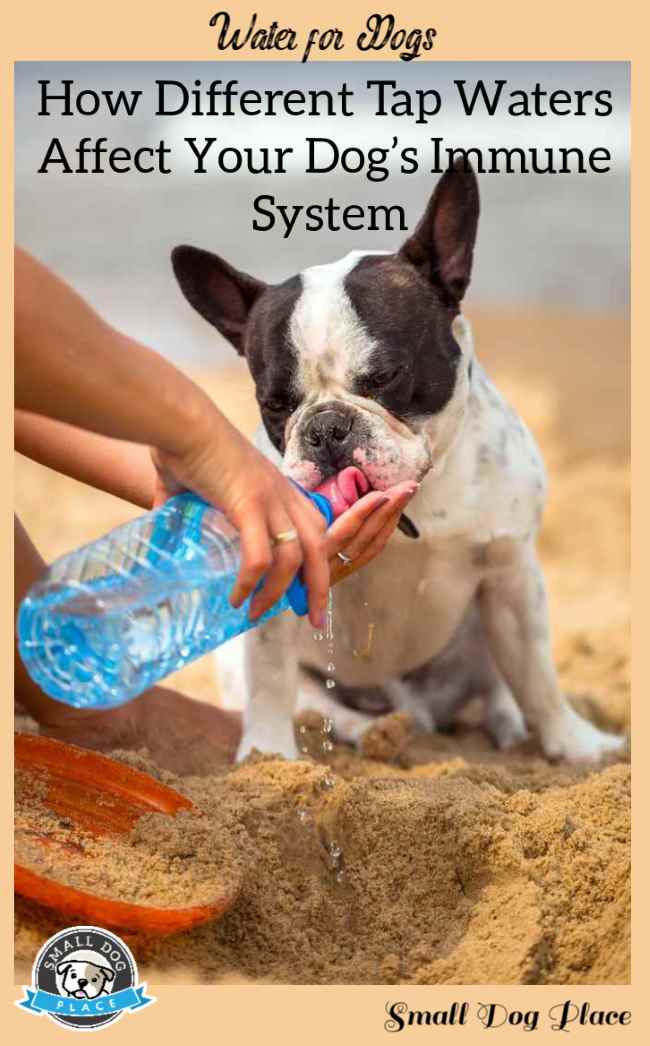- Small Dog Place Home
- Feeding
- Water for Dogs
Water For Dogs: How Different Tap Waters Affect Your Dog’s Immune System
Water for Dogs By Heman Thuranira |Updated 03-11-2024
Do dogs need water? Of course they do, but do you know how to adequately hydrate your dog for optimal health?
However, for your pet to stay healthy, you must give proper nutrition, exercise, groom the dog, and provide clean water. Remember, pet hydration is crucial, and the type of water offered matters a lot.
If you allow your dog to drink contaminated water, they will be likely to succumb to infections. Although there are different types of water sources, there are also many tap water effects on dogs.
 Dog hydration is crucial, and the type of water offered matters a lot.
Dog hydration is crucial, and the type of water offered matters a lot.What are the Benefits for Water to Dogs?
Water is an essential part of your pet's nutritional needs. Although your dog can persevere for days without food, dehydration in dogs can easily lead to death.
For this reason, supply your dog with adequate water each day to hydrate your dog and avoid the chances of drinking from contaminated sources.
If you own a small dog such as the Chihuahua, Pomeranian, or the Yorkshire Terrier, supply them with enough water all the time. Small dogs are generally hyperactive and love racing around; as such, they use lots of energy, hence the need for constant hydration.
Water benefits your dog in various ways; it's useful in digestion, transportation, and absorption of nutrients.
Water also regulates your pet's body temperature and replaces any fluids that your dog loses during sweating and excretion.
Moreover, it helps your dog to excrete toxins, neutralize the blood, make the skin elastic, lubricates the joints, and keeps your dog's mouth and nose moist, and this allows the pet to shower you with face licks.
Which type of water is best for your dog?
There are different types of water for dogs, but not all are the same; some are suitable for your small dog, while others can harm your pet. Below are some of the categories.
a) Unfiltered Tap Water for Dogs
 Unfiltered tap water is accessible in almost all homes but can contain different contaminants, which can be harmful to your dog.
Unfiltered tap water is accessible in almost all homes but can contain different contaminants, which can be harmful to your dog.Although most pet owners allow their dogs to drink tap water, this doesn't mean that it's the best water for your pet. Unfiltered tap water is accessible in almost all homes but, can contain different contaminants, which can be harmful to your dog.
Unfiltered tap water may have things like heavy metals, pesticides, viruses, parasites, industrial chemicals, bacteria, and many more.
These can cause adverse health effects such as gastrointestinal illnesses, neurological disorders, as well as reproductive problems.
Remember, small dogs like the Norwegian Elkhound, the Tibetan Terrier, and the Welsh Terrier are very resilient and robust enough to stay outside most of the time; this way, they can quickly drink unfiltered water when out of the house.
For this reason, it is advisable to give unfiltered tap water every time your dog wants to go out, and this lessens the temptation to drink contaminated water outside.
b) Bottled Water for Dogs
 Can I give my dog bottled water?
Can I give my dog bottled water?Many pet owners think that bottled water is the best alternative to give their dogs. However, a study conducted in 2008 discovered different combinations of pollutants in some of the bottled water brands in the U.S.
Some of the contaminants include arsenic, fertilizer residue, bacteria, and industrial chemicals equivalent to the same levels in polluted tap water.
Can I give my dog bottled water? Plastic water bottles may also contain bisphenol A, which is a type of industrial chemical that can leak into the water. It's also linked to many health hazards, the reason why bottled water may not be the best for your dog.
c) Distilled Water for Dogs
Distilled water boils to the extent of destroying all the contaminants then the steam is condensed and bottled. Although purified water may be great, the process of distillation also removes all the essential minerals which are vital for your dog's health.
Therefore, when your pet drinks this type of water, they are likely to experience a sodium imbalance in the blood, lower levels of red blood cells, and a heightened secretion of cortisol.
Consumption of distilled water may not affect your dog in the short-term but should not be your pet's primary source of hydration.
d) Hard Water for Dogs
Salty water can also be dangerous for your dog's health. Although it's not a contaminant, dogs living in homes with such water are more likely to experience urinary health problems.
Also, magnesium present in the water can support the growth of urine crystals or struvite stones.
e) Filtered Water for Dogs
As the name suggests, filtered water is the regular tap water that has undergone filtration to expel impurities. It’s also the best water for dogs. There are distinct types of filters and filtration options that eradicate different contaminants.
Therefore, to effectively purify your pet's water, it's good to know the kind of pollutants present in your water then look for the best filter to suit your needs.
By acquiring the best filter, you can turn polluted tap water into a cost-effective and healthy source of hydration for not only your pet but also your entire family.
How can tap water affect your dog's immune system?
1. Exposure to Toxins
Although this may seem obvious, dogs get exposed to various chemicals in the environment, and this can affect their immunity.
Some of the common toxins are from chemicals used for the treatment of parasites. These are like spot-on treatments as well as worm injections.
These contain insecticides or other chemicals that act as neurotoxins and can have a long-term effect on your pet or even result in death in some dogs.
Toxin exposure can as well come from a low-quality diet, processed foods, cigarette smoke, car exhaust fumes, household cleaning products, and many more.
However, tap water is one of the leading sources of contamination in dogs, and tap water contains different chemicals ranging from viruses, parasites, pesticides, and metals. Some of the common contaminants in tap water include;
 Tap water is one of the leading sources of contamination in dogs.
Tap water is one of the leading sources of contamination in dogs.a) Lead
Lead can cause your dog to experience acute stomach upsets, diarrhea, or vomiting when swallowed in high quantities, and these ailments can significantly lower your dog's immunity. In cases of a young dog, they can easily cause death.
Moreover, if your dog is exposed to lead for an extended period, the pet may suffer from seizures, poor appetite, anxiety, fatigue, change in behavior, or blindness.
b.) Arsenic
Arsenic can enter drinking water in many ways, such as industrial pollution, as well as runoff from farms using herbicides or pesticides.
Although the levels of arsenic that can be present in tap water are relatively low, with continued consumption, your dog may develop abdominal pains, become unconscious or lethargic.
All these ailments can have a significant effect on your dog's immune system; for young dogs, the consequences can be more severe since they usually have weak immunity.
c.) Pesticides
Pesticides are useful in killing insects, and fungi since they prevent them from destroying crops. The long-term effects of pesticides on human beings are autism, some cancers, infertility, and many other illnesses.
On the other hand, pesticides also affect pets negatively; pesticides used on lawns are linked with cancer in cats and dogs. However, if you don't use them in your yard, runoff from other sources can also be a threat to your small dog.
d.) Microorganisms
Water treatment plants are crucial in determining the presence of bacteria in any water supply and add chlorine to eradicate them. However, viruses are smaller and not easily detectable. Treating your water using chlorine can probably get rid of some viruses, but it's hard to detect their presence. Some waterborne viruses can cause gastrointestinal problems in pets and humans.
e.) Coli
Although some types of E.Coli bacteria are harmless, some dangerous strains are present in tap water.
Dogs infected with the E.Coli bacteria exhibit signs such as diarrhea, depression, stress, vomiting, and lack of appetite, all of which can weaken your dog's immune system making it more susceptible to many other infirmities.
2. Exposure to Infections
Since tap water may contain bacteria and viruses, these expose your dog to diseases like urinary tract infections and many other ailments. We are all aware that even the slightest of conditions can weaken your pet's immunity or kill your dog. As such, it's crucial to give the best water for dogs to drink all the time.
Water for Dogs: The Takeaway
There are various tap water effects on dogs; the reason why water containing no contaminants is the best for your pet. So ensure that your pup drinks sufficient clean water daily.
Remember ordinary tap water lots of chemicals and heavy metals, and it's best not to give your dog. And this is particularly true for young dogs whose immunity hasn't developed fully or small dog breeds susceptible to struvite crystal formation.
Pin for Future Reference
Water for Dogs: Author Bio
Heman Thuranira is a competent SEO content writer who specializes in offering blog writing, ghostwriting, and copywriting services. He takes pride in providing SEO optimized, engaging, and high-quality digital marketing content to both B2B and B2C businesses.
His content will increase your business, blog, or website social media attention and search engine ranking. For any SEO content writing service assistance; he is your go-to Guru.
More About Janice (author and voice behind this site)
Janice Jones has lived with dogs and cats for most of her life and worked as a veterinary technician for over a decade.
She has also been a small-breed dog breeder and rescue advocate and holds academic degrees in psychology, biology, nursing, and mental health counseling.
Her work focuses on helping dog owners make informed, responsible decisions rooted in experience, education, and compassion.
When not writing, reading, or researching dog-related topics, she likes to spend time with her six Shih Tzu dogs, her husband, and her family, as well as knitting and crocheting.
She is also the voice behind Miracle Shih Tzu and Smart-Knit-Crocheting

Free Monthly Newsletter
Sign Up for Our Free Newsletter and get our Free Gift to You.
my E-book, The Top 10 Mistakes People Make When Choosing a Dog (and how to avoid them)
